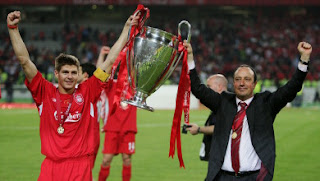The Last Dance
Netflix Original | Directed by Jason Hehir
“Ο γαρ εάν σπείρη άνθρωπος, τούτο και θερίσει”
“You reap what you sow.”
- Paul’s letter to the Galatians 6:7
Three weeks ago, if anyone had asked me what I knew about the Chicago Bulls and Michael Jordan, I’d have just about managed four words: basketball, Nike, Air, Jordan.
The 10 part documentary series The Last Dance, on Netflix, is not just the best sports documentary ever. It is probably the best documentary ever, on any subject. Jeez, it may even just be the best thing I’ve ever seen.
It’s an amazing odyssey from a poor background, a solid family, to a career and an achievement that has reached the pinnacle of sustained human and sporting endeavour.
“Babe Ruth. Muhammad Ali. Michael Jordan. That’s it. That’s the list. There is no-one else”, says one of the sports journalists covering the era.
The story covers the rise of MJ and his skill and drive to succeed, and the building of a team with other great players like Dennis Rodman, and the brilliant coach Phil Jackson. Jackson introduces Native American philosophy and mindfulness, creating an unbreakable bond and an ultra-strong team ethic.
You don’t need to like basketball or even sport, to enjoy the driving narrative, the interviews, the politics, the graft and the hard work that it took.
It’s a human story with all the dramatic ingredients necessary for a memorable experience. The betrayals, the moments of greatness, the luck, the tragedies, the characters.
The brilliant use of an irregular time sequence, clearly jumping back and forth, but telling you which year you are at now, is a great story telling device. Our minds are not linear. It works so well. It reminded me of the Mexican director Alejandro Inarritu’s brilliant film “21 Grams”. It jumps around like a jigsaw in time, but you are able to piece it together after while.
A brilliant sequence about the maverick, wild duck team member Dennis Rodman, shows him partying and cutting loose. It took MJ to go and get him back and into training again.
Walking into training in his pyjamas and slippers, Rodman is asked by coach Phil Jackson, “Did you put your body through anything today, Dennis? The muscles need a memorisation too”. Jordan replies, “Just be happy he’s back, Phil. Don’t ask for too much”. He knew that you don’t put a saddle on a thoroughbred horse.
Netflix were releasing a few episodes at a time over May. Now the complete series is available.
The even greater beauty of it is, that I went back, having seen the whole series, to watch Episode I again. I understood it much better, having seen the whole saga. And then, before I knew it, I was already watching Episode IV again. There’s only one way this is going.
What makes a “Super Team” has forever exercised the minds of business people, psychologists and sports enthusiasts. The Chicago Bulls can certainly lay claim to be one of the best ever teams in history. Along with the New Zealand All Blacks in rugby, the Brazil team of 1970 in football, Liverpool FC (1970s and 80s) and Manchester United (1992 to 2012).
When asked about whether being a great champion had come at the expense of being thought of as a nice guy, Michael Jordan is pensive and smiling. Eventually he’s crying, “Winning has a price”, he says. “Leadership has a price. If you won’t wanna play that way, don’t play that way”.
Breathless. Pulsating. And a brilliant soundtrack to drive the mood and motion along. It’s quite a ride.
Final story.
In 1984, Nike offered Michael Jordan $250,000 and his own line of trainers. Everyone thought they were insane, “You’re gonna pay him what? A new kid. A rookie. Who’s done nothing”.
They hoped, by the end of year four, to sell $3m worth of Air Jordans. In year one, they sold $126m. And today, in 2020, the division and product line generates an astonishing $1bn a year for Nike.
James Neophytou



Comments